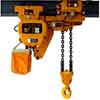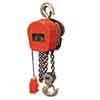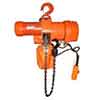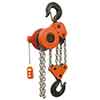The range of lifting equipment covered by Dongqi Crane is very wide and the Regulations can apply across all industry sectors; from healthcare to construction, most industries and commercial activity will use some kind of lifting equipment.
Technological progress has meant that innovative, often complex and powerful lifting equipment is now available for use. Nevertheless, whether it is modern and complex or more traditional lifting equipment, Dongqi Crane will apply if it is used by employees or the relevant self-employed at work. If you are self-employed and your work poses no risk to the health and safety of others, then health and safety law may not apply to you.
There are three key terms used in reference to the Regulations: ‘lifting equipment’; ‘lifting operations’; and ‘the load’.
Lifting equipment types
Lifting equipment is any work equipment for lifting and lowering loads, and includes any accessories used in doing so (such as attachments to support, fix or anchor the equipment). Many different types of heavy lifting equipment are available in the marketplace, including forklifts, winches, hoists, cranes, and vacuum lifts. Each machine uses a unique mechanism to manipulate a large and heavy object; some devices move the item up and down or side to side, as well as a combination of both movements. Normally, a business will purchase or lease heavy lifting equipment based on the specific industry’s needs.
Forklifts are a common lifting machine for many businesses. A worker drives the forklift, much like a small vehicle. The machine’s front end has two metal protrusions that can be slid into a wood pallet to move products around a warehouse environment; the forked front end can lift items up into tall storage areas in a safe manner.
Another heavy lifting equipment device is a winch. This mechanism uses a wound rope to pull a item, such as during towing. Most winches are attached in a stationary position against a wall or even on a heavy service truck; workers can attach the winch’s end hook to a piece of equipment to allow the winding mechanism to pull the item along.
A hoist pulls heavy items upward using a chain or rope; this form of heavy lifting equipment is typically used for lifting smaller products, such as a car engine block. Many hoists are permanently attached to the ground in a repair shop or warehouse area. The heavy object must be maneuvered over to the hoist for lifting; many times, forklifts are used in conjunction with hoists to move the item to the permanently set lift.
A crane uses an angled boom to move items up and down, as well as side to side. Of all the heavy lifting equipment types, the crane is one of the most versatile. Cranes can be built in small and large sizes, based on the lifting needs; most crane designs allow the lift to turn horizontally in a complete circle to move heavy objects in almost any direction.
Vacuum lifts use high pressure air vacuums to adhere to a heavy object for lifting. These machines are especially helpful for lifting oddly-shaped items, such as panes of glass. They can also lift heavier objects, such as cargo containers, so that ships in port can be loaded and unloaded efficiently.
Purchasing a lift can be extremely expensive; many businesses lease or rent certain lift types depending on the company’s needs. A lease can generally be contracted for daily, monthly, or yearly lift use. The business owner should confer with the equipment leasing company to ensure the correct lift choice for the specific company application.
Besides the lifting equipment above, the following lifting equipment are also frequently used for material handling. The common lifting equipment includes:
- Overhead cranes and their supporting runways
- Patient hoists
- Motor vehicle lifts
- Vehicle tail lifts and cranes fitted to vehicles
- A building cleaning cradle and its suspension equipment
- Goods and passenger lifts
- Telehandlers and fork lifts
Lifting accessories
Lifting accessories are pieces of equipment that are used to attach the load to lifting equipment, providing a link between the two. Any lifting accessories used between lifting equipment and the load may need to be taken into account in determining the overall weight of the load.
Examples of lifting accessories include:
- Fiber or rope slings
- Chains (single or multiple leg)
- Hooks
- Eyebolts
- Spreader beams
- Magnetic PDF and vacuum devices
Further details and examples of equipment covered by DONGQI CRANE can be found in the Approved Code of Practice and guidance.
Lifting operations
This is a term defined by DONGQI CRANE regulation 8(2): ‘In this regulation “lifting operation” means an operation concerned with the lifting or lowering of a load.’
The load
The load includes any material, people or animals (or any combination of these) that is lifted by the lifting equipment. Loads are often provided with permanent or semi-permanent fixed or attached points for lifting. In most cases, these are considered to be part of the load.
Examples of loads include:
- Loose bulk materials
- Sacks, bags, pallets and stillages
- Discrete items (such as a large concrete block)
- Machinery and any permanently attached lifting eyes
- A skip and the lugs fixed to its side
Dongqi Lifting Equipment
We have a wide variety of lifting equipment to meet all your lifting needs. Custom lifting equipment from Dongqi Crane has the following features:
- Safer, lower-cost alternatives to standard products
- Prepackaged lifting solutions for OEM applications
- Efficient, worker-friendly designs for repetitive lifts
- Designs developed by lifting industry engineering experts
The lifting equipment offering of Dongqi Crane
Various types of hoists are provided by Dongqi Group, the following list will give you a general introduction of Dongqi Hoists. Please contact us to select the right Hoists and lifting equipment for you application.
Chain Electric hoist
 Electric hoist | The electric chain hoists can be used to handle material with the lifting capacity of 0.5 ton to 35 ton, lifting height of 3 to50m, with the working class of M3 and M4. Hoistdq offers you various types of electric chain hoists to solve you material handling solutions. |
| DHS Series Electric Hoists, | TCH series Chain Electric Hoist | DHP series Chain Electric Hoists |
 |  |  |
DHS Series Electric Hoists:1 ton, 2 ton, 3 ton, 5 ton,10 ton | TCH series Chain Electric Hoist:1 ton, 2 ton, 3 ton, 5 ton,10 ton | DHP series Chain Electric Hoists:1 ton, 2 ton, 3 ton, 5 ton,10 ton |
More information about Chain Electric Hoist, please click.
没有评论:
发表评论